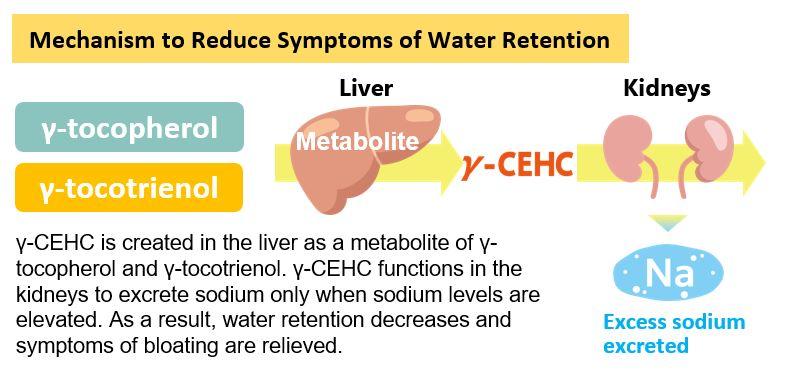Approximately 70% of women*
1
are affected by premenstrual syndrome (PMS), characterized by subjective symptoms including water retention, irritability, and general malaise occurring during the luteal phase of the menstrual cycle.
It has been suggested that supplementation of γ-tocopherol (γ-Toc), γ-tocotrienol (γ-TT), equol (EQL) and calcium (Ca) may effectively relieve physical (water retention, etc.) and psychological (irritability, etc.) PMS symptoms.
The mechanism of relief may be attributable to the diuretic action of γ-Toc and γ-TT metabolite γ-CEHC*
2
(reduction in water retention) and the effect of calcium in lowering levels of intact PTH*
3
(reduction of irritability, etc.).
Otsuka Pharmaceutical Co., Ltd. (Head office: Tokyo, Japan; President: Makoto Inoue; hereinafter Otsuka) is engaged in research related to products that support women's health. Among these efforts, a research paper suggesting that consumption of γ-tocopherol, γ-tocotrienol, equol and calcium via a supplement containing these four ingredients (γ-toco composite supplement) may alleviate subjective symptoms of PMS, experienced by approximately 70% of women*
1
, was published in the July 30 issue of
The Journal of Japan Society for Menopause and Women's Health.
Research Overview
Aim:
To examine the effects of supplementation of γ-tocopherol (γ-Toc), γ-tocotrienol (γ-TT), equol (EQL) and calcium (Ca) for alleviating subjective symptoms during the luteal phase of the menstrual cycle.
Methods:
The trial was conducted with 60 women who showed both reduced 24-hour urinary sodium excretion and increased symptoms of water-retention during the luteal phase compared to the follicular phase. The randomized double-blind crossover trial involved administration of a test supplement(γ-Toc 90 mg,γ-TT 15 mg,EQL 2 mg,Ca 250 mg per day)or a placebo after the evening meal for seven days during the luteal phase. For the first four days, subjects recorded the level of premenstrual symptoms in the course of normal daily life; on the fifth day subjects entered a testing facility where, under a prescribed diet, urinalysis, blood sampling, body weight and subjective symptoms were measured chronologically for 48 hours from the morning of the sixth day.
Results:
Among 49 subjects who completed the trial, 35 women were targeted for analysis. Compared with the placebo, test supplement consumption indicated a significant reduction (p< 0.05)in subjective symptoms such as facial swelling, abdominal bloating, irritability and depressed moods. In addition, 24- and 48-hour urinary excretion of sodium and 24-hour urinary volume were significantly higher (p< 0.05) with administration of the test supplement compared to the placebo. Blood levels of γ-Toc, γ-TT and their metabolite γ-CEHC as well as 48-hour urinary levels of EQL were significantly higher (p< 0.05) with the test supplement compared to the placebo, while blood levels of intact PTH were significantly lower (p< 0.05). No significant differences were seen between supplement and placebo in urinary excretion of potassium, blood levels of electrolytes, or hemoglobin levels.
Conclusion:
It was indicated that supplements containing γ-tocopherol, γ-tocotrienol, equol and calcium may be effective for alleviating subjective physical and psychological premenstrual symptoms during the luteal phase. The mechanism of relief may be attributable to the diuretic action of γ-Toc and γ-TT metabolite γ-CEHC*
2
and the effect of calcium in lowering levels of intact PTH*
3
.
Title: The effects of γ-tocopherol, γ-tocotrienol, equol and calcium supplementation on premenstrual symptoms: a randomized, double-blind, crossover trial
Authors: Tomoko Higuchi, Tomomi Ueno, Shigeto Uchiyama, Tatsuya Yoshihara, Shunji Matsuki, Kiyoshi Takamatsu
Published in:
The Journal of Japan Society for Menopause and Women's Health
29 (4) 578-587, 2022
*1
Source: Otsuka Pharmaceutical survey of 1,000 women, aged 30 to 44; June-July 2021
*2
γ-CEHC:Types of vitamin E, γ-tocopherol and γ-tocotrienol are metabolized in the liver to create γ-carboxyethyl hydroxychroman (γ-CEHC). This metabolite is said to function as a mild natriuretic (promoting urinary excretion of sodium) when levels of sodium are excessive.
*3
intact PTH:Parathyroid hormone, excreted when blood levels of calcium are low. PTH stimulates release of small amounts of calcium from the bones into the bloodstream, increasing the level of calcium in the blood.
γ-tocopherol (γ-Toc), γ-tocotrienol (γ-TT)
Among the eight types of natural vitamin E, nuts and green and yellow vegetables are rich in the most commonly known type, α-tocopherol. Found in vegetable oils, γ-tocopherol and γ-tocotrienol are known to alleviate water retention. In the liver, γ-tocopherol and γ-tocotrienol are metabolized into γ-CEHC (compared to γ-tocopherol, γ-tocotrienol is more efficiently metabolized). When levels of sodium are excessive, it is believed that γ-CEHC influences the kidneys to excrete sodium and alleviate symptoms of water retention.
Equol
Equol is a metabolite produced by the action of intestinal bacteria from a soy isoflavone daidzein. The chemical structure of equol is similar to that of estrogen. It is known that equol is not soy isoflavones but is the key to supporting women's health. However, the proportion of equol-producers after consuming soy in Japanese is approximately 50%, then that is only 20% among younger women. The study reported that equol-producers have a lower risk of suffering PMS. (Source: Obstetrics and Gynecology; 83(12): 1434-1439, 2016)
Calcium(Ca)
Various vitamins, minerals and herbal remedies are commonly used around the world to alleviate symptoms of PMS, but a systematic review showed only calcium had good quality evidence to support its use in PMS. Crucial for maintaining healthy bones, calcium is an essential mineral that is also related to reduction in irritability and improved mental condition. However, Japanese have chronically low calcium intake. Japan's Ministry of Health, Labour and Welfare standards recommend consumption of 650mg per day for women in their 20s to 40s, but actual consumption is approximately 400mg, a deficiency of 200 to 250mg per day. Correcting this deficiency is also important for management of PMS symptoms.
Otsuka Pharmaceutical's Women's Health-related Research and Development and Public Awareness Activities
In the course of long-term research into the benefits of soy, Otsuka Pharmaceutical began to focus on the mental and physical fluctuations experienced by women during menopause, with research into women's health issues initiated at the Saga Nutraceuticals Research Institute in 1996. In 2002, Lactococcus 20-92, the lactic acid bacterium that produces equol, was successfully isolated. Subsequent research has been conducted in Japan and overseas into the efficacy and safety of equol produced by soy germ fermented with this lactic acid bacterium. PMS-related research has continued in parallel. Otsuka also collaborates with medical specialists to provide comprehensive information about maintenance and promotion of women's health and enhancement of quality of life.










